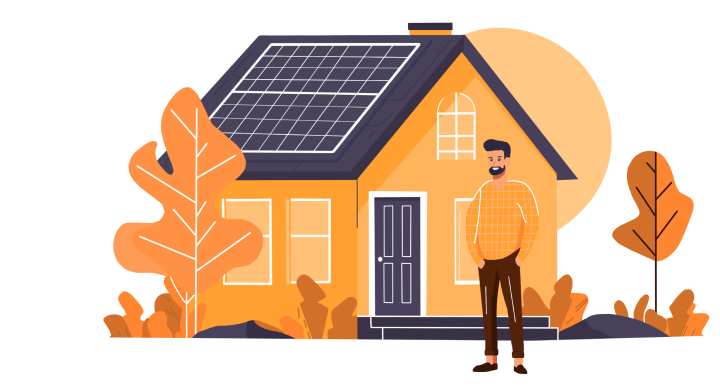Having a residential solar power installation is a game changer for homeowners looking to reduce energy costs and contribute to a greener future. You may be wondering, though, where to even begin with this project.
Before you can get started on having your solar panel setup installed and enjoying the solar power benefits it comes with, there are some considerations to take into account. Solar Energy Host wants to help you switch to renewable energy as smoothly as possible, which is why we're here with a guide on how you can get started on your residential solar power installation project.
Step #1: Assess the suitability of your home for solar panels.
Ensure your roof gets sufficient daily sunlight.
You get optimal solar panel efficiency when your solar installation gets enough sunlight.
To gauge how much sunlight your roof gets, start by observing it at different times of the day to see how much sun it gets. Take note of any potential obstructions, such as nearby trees, chimneys or buildings, that might cast shadows on your roof.
A consistent amount of sunlight is crucial for the efficiency of your solar panels.
Verify that your roof can support the weight of solar panels with the help of an expert.
A qualified contractor can help assess whether your roof can support the additional load of solar panels. They will inspect various aspects, such as the age of your roof, the material it's made from and any underlying wear and tear, to determine if it's structurally sound enough for a solar panel installation.
Having a professional inspection done will give you peace of mind and potentially save you from costly repairs down the line.
Step #2: Calculate your household's energy consumption.
Review electricity bills from the past year to identify your monthly and annual energy patterns.
To get a better idea of how much residential solar energy can potentially offset your energy usage, you need to analyze your consumption patterns.
Carefully examine each month's bill to find patterns in your energy consumption and note which months have higher electricity usage. This information will help you understand seasonal demands or lifestyle factors that lead to increased consumption and show you how much solar power can offset your usage.
Step #3: Learn about the financial commitment and incentives.
Calculate the initial investment and ongoing costs for solar installation.
Before hiring solar installers, you must have a clear understanding of the cost of residential solar power installation projects.
Start by determining the total upfront costs for your equipment and installation. This includes the price of solar panels, and inverters as well as labor costs for the installation process. You should also consider the price of batteries if you're getting a storage system.
Then, factor in ongoing maintenance or service fees, which can vary depending on the quality of your system and the warranties that come with your chosen solar installation services.
Research available tax incentives, rebates and grants that could reduce initial costs.
One of the benefits of residential solar power installation is the available incentives. Look into the federal, state and local tax incentives and exemptions you're eligible for to get a better idea of how much these can reduce your initial solar panel installation cost.
Step #4: Utilize Solar Energy Host to compare solar panel installation options.
Solar Energy Host delivers multiple quotes from reputable local installers to you, providing you with a range of options without overwhelming you. This way, you can narrow down your search to companies that serve your location and fit your budget with just a few clicks. That means no more reaching out to dozens of contractors for quotes one by one!
Once you've narrowed down your choices, you can then have an easier time choosing a solar provider that aligns with your specific needs and long-term goals.
Step #5: Plan and schedule the installation process.
Obtain the necessary permits and ensure your installation complies with all local building codes and solar installation regulations.
Before installation begins, you'll need to apply for and obtain the necessary permits from your local government, which can include zoning permits, construction permits and electrical permits. Ensuring that your installation meets all local building codes and regulations helps avoid potential legal issues and penalties.
Coordinate with your provider to schedule the solar panel installation at a time that causes minimal disruption to your household.
Schedule your installation at a convenient time that suits your family's routine and reduces disruptions. Take into account factors like your work schedule, your kids' school hours and any planned vacations or activities.
Frequently Asked Questions (FAQ)
How long does it take to install a solar power system?
It typically takes one to three days to install a solar panel system for your home. However, this duration largely depends on the size and sophistication of your residential solar power installation.
Plus, take note that while the actual installation usually just takes one or a few days, the whole process, from inspections and permitting to installation and connecting to the grid, can take multiple weeks.
What should I do if my solar power system isn't producing enough energy?
Contact your solar installation provider to report the issue. They can conduct a thorough system check to identify any problems, which might include shaded panels, dirt accumulation or malfunctioning hardware. Sometimes, simple maintenance like cleaning the panels or replacing a faulty inverter can solve the problem.
How do solar panels impact my home's energy efficiency rating?
With a residential solar power installation, you generate your own electricity and lower your dependency on external power sources. This reduction in grid usage leads to a lower overall energy consumption rate, enhancing your home's energy efficiency.
Your gateway to solar savings
As your trusted partner, Solar Energy Host connects you with top local providers and delivers their competitive solar panel installation quotes to you. This way, you can get started on your residential solar power installation while being assured that you're making an informed decision and not missing out on the best deals in your area.
Find out how much it will cost to install solar panels now!














